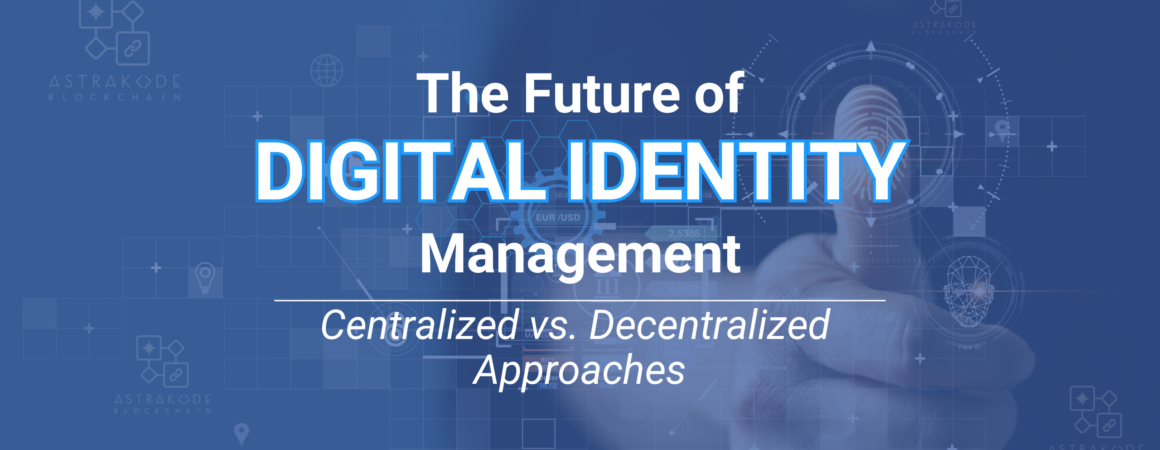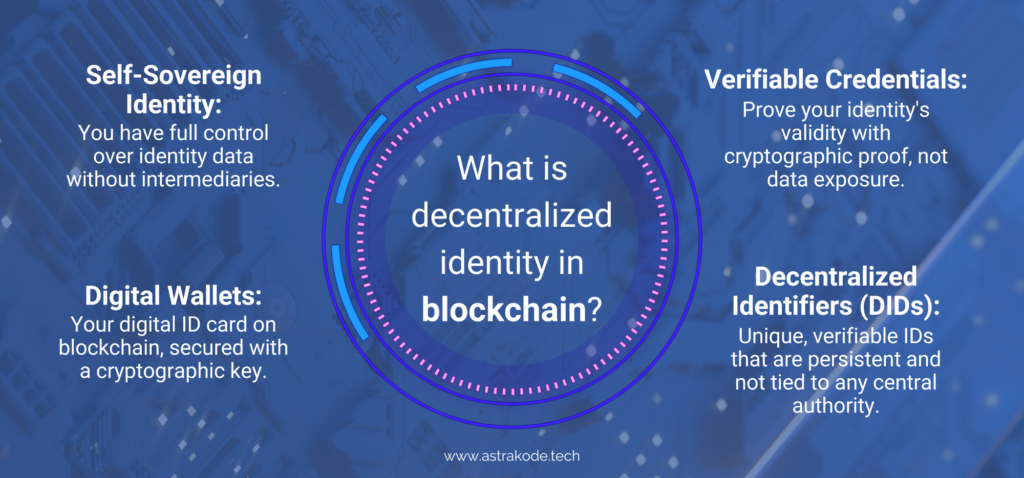
Astrakode: Simplifying Blockchain Development with Low-Code Solutions
In today’s fast-paced world, the demand for quick and efficient solutions has never been higher….

Identity management refers to the process of creating, storing, and securely managing individuals’ digital identities and their associated permissions within a system. At its core, it encompasses a suite of tools and technologies that ensure the right individuals access the right resources at the right times and for the right reasons. This system is pivotal for organizations to increase security, streamline user experiences, and meet regulatory compliance.
Over time, as threats have evolved and the digital landscape has expanded, the emphasis on robust identity management has grown, pushing for innovations like decentralized identity solutions provided by blockchain technology.
Digital identity refers to the online representation of an individual’s personal information, often consisting of usernames, passwords, biometric data, and more. In an increasingly digital era, these identities play a crucial role in simplifying transactions, from personal banking to enterprise-level operations. They have revolutionized how organizations verify credentials, allowing for rapid authentication without direct engagement with the issuing entity, such as a university or licensing board. Modern technologies, like QR code scans, have enabled the instant validation of one’s qualifications, streamlining processes like recruitment and securing data through public-key cryptography.
Yet, the path isn’t devoid of challenges. Organizations are bound by stringent regulations on data management, with penalties looming for non-compliance. Data breaches pose significant threats, with small businesses incurring average costs of US$108,000 annually. It takes them about 206 days to even identify a breach, followed by 73 days of remediation. Such breaches hit smaller entities hard, with them bearing 43% of all data breach cases. For larger corporations, the costs can average US$204 per employee, while small businesses might see a steeper cost of US$3,533 per employee.
Traditionally, our digital identities have been managed and stored by centralized entities. These can be tech giants, social media platforms, financial institutions, or even governmental organizations. Users provide their details, which are then stored on centralized servers. The control is, therefore, predominantly in the hands of the service providers.
When we refer to ‘identity’, it’s a broad term that includes a multitude of elements:
Centralized identity systems, prevalent today, pose notable issues. They are attractive targets for hackers due to the consolidation of data, risking millions of users’ personal information like we discussed earlier. Furthermore, these systems frequently sideline users, offering them scant control over their data usage and sharing, raising privacy alarms. Plus, the repetitive need for verification in such setups introduces inefficiencies and can wear out users. This is where the concept of decentralized identity comes into the picture, offering a transformative solution to the aforementioned challenges.
At its core, a decentralized identity is about giving control of identity data back to individuals. Unlike traditional centralized identity systems where companies or organizations manage and control your identity data, decentralized systems leverage blockchain technology to distribute the control. Here’s what that means:

If we take healthcare as an example, in a decentralized identity framework, healthcare centers retain medical records, but the dynamics of storage and access undergo a shift. Individuals reclaim data ownership, with their medical details linked to a unique blockchain ID. While healthcare entities might still house encrypted data, either on a decentralized network or a secure off-chain database, the blockchain often stores a reference to the information. This setup fosters enhanced interoperability, allowing varied healthcare systems to seamlessly share and access data through a common decentralized identity protocol.
Regarding data access and sharing, the person with their blockchain ID is in control. They grant permissions for any data access or sharing, ensuring only authorized entities can decrypt and view their records. As new medical data emerges or existing records update, they’re securely stored, with individuals receiving notifications, thereby streamlining control and enhancing security in the personal health information.
As an example, companies that has adopted this approach are Medicalchain and BurstIQ. They use blockchain technology to securely store health records and maintain a single version of the truth. Different organizations such as doctors, hospitals, laboratories, pharmacists, and health insurers can request permission to access a patient’s record to serve their purpose and record transactions on the distributed ledger. This ensures that only authorized entities can decrypt and view the records, enhancing security in personal health information. As new medical data emerges or existing records update, they’re securely stored, with individuals likely receiving notifications.
The escalating urgency for a fortified identity system in today’s data breach-prone landscape has spotlighted decentralized identity as a beacon of privacy, control, and security. Building this ecosystem hinges on pivotal components: Decentralized Identifiers (DIDs) that are globally unique and free from centralized tethering; verifiable credentials resistant to forgery; digital wallets for managing these IDs; and an emphasis on interoperability for system-wide cohesion.
It also demands robust consent mechanisms, decentralized data storage, data minimization principles, and symbiotic collaboration across public and private sectors. This ecosystem is not merely a tech transition, but a transformative rethinking of identity, trust, and data, winning a digital world that’s more transparent and empowering for users.
Decentralized identity is more than a mere technological shift; it’s a paradigm change in how we view and manage identities. Here’s a glimpse into its promising future:
As you navigate the evolving world of identity management, remember: decentralized identity is not just a trend; it’s the future. At AstraKode, we believe in leveraging this technology to its fullest, ensuring a safer, more transparent digital world for everyone. Whether you’re a tech CEO, a startup enthusiast, or someone simply curious about the future of identity, we’re here to guide you through it and democratize blockchain technology with our low code platform. Sign up for free and start your journey today!

In today’s fast-paced world, the demand for quick and efficient solutions has never been higher….

Blockchain technology is transforming media and entertainment by reducing piracy, increasing transparency, connecting artists directly…

The blockchain market has been constantly growing in the latest years, and is now approaching…